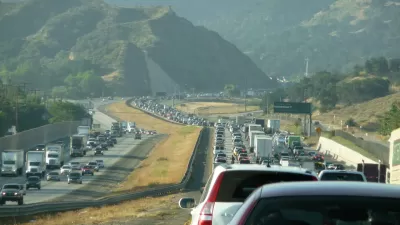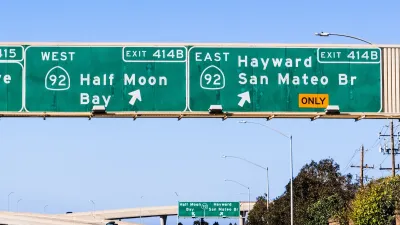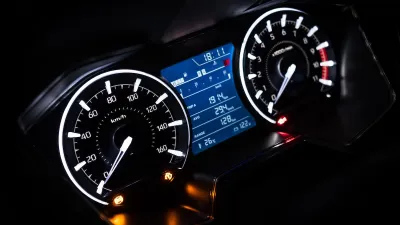The United States must move away from the gas tax to solutions that charge people for the roads they use, including a VMT fee, congestion pricing for peak hours and toll roads, says Jack Finn of HNTB. Such efforts will encourage Americans to be less dependent on oil, reduce congestion, take public transit and properly invest in infrastructure.
 Americans hate the gasoline tax about as much as they love their cars.
Americans hate the gasoline tax about as much as they love their cars.
At the federal level, money from a gas tax was first placed into the Highway Trust Fund in 1956 as the country embarked on President Dwight Eisenhower's grand vision of establishing a network of interstate highways to spur commerce and aid in the country's defense.
Now, more than 50 years later, Eisenhower's long-ago realized vision is reaching the end of its useful lifespan, and the gas tax itself is running on empty.
This is unwelcome news to the average American driver, already suffering through the current economic downturn and the painful $4 per gallon gas that preceded it.

For years we've comforted ourselves with the notion that filling up at the pump pays for our roads in full. This is nothing more than a myth, a misperception that must end. In fact:
- There is no such thing as a free road. Anyone who has paid off a mortgage knows there are always costs of home ownership. Renovations, expansions and simple upkeep - while necessary - can be expensive. Simply paying off the original financing on a transportation project doesn't mean it's paid for either.
- Roads don't pay for themselves. Research from the Texas Department of Transportation has compared how much gasoline is consumed on a roadway with how much gas tax that generates, revealing that no road completely pays for itself over a 40-year lifespan.
- Weve run up a huge transportation tab. Crumbling roads, rusting bridges and congestion are all signs we've deferred too much maintenance. According to a national commission that studied our surface transportation needs, we need to invest at least $225 billion annually for the next 50 years to repair and upgrade the system. The longer we wait the more expensive it becomes.
- The gas tax isn't what it used to be. The federal gas tax, now set at 18.4 cents per gallon, was last increased in 1993. A combination of inflation, changing driving habits - due in part to higher gas prices - and better fuel economy of our cars has robbed it of much of its purchasing power. In fact, the trust fund is broke, needing infusions from the general treasury totaling more than $15 billion in the last year alone.
The way we fund our roads is at odds with almost every other public policy America has adopted. While proposed climate change legislation, green energy initiatives and even our foreign policy demand that we move away from a dependence on oil, we pay for our transportation system almost entirely by using more of it.
In the short-term, we need to consider an increase in the gas tax. It's a bitter pill to swallow, but it's the only way we can ease the congestion we face. At last count, that congestion costs every traveler in the U.S. $750 a year. A gas tax increase between 5 cents and 8 cents each year during the next five years will cost average Americans only $10 to $20 each month per car.
In Britain and much of Europe the gas tax is nearly $4 per gallon, 20 times the federal tax in the U.S.
In the long-term, we must move away from the gas tax to solutions that actually charge people for the roads they use, including a vehicle miles traveled user fee, congestion pricing for peak hours and more toll roads. We're willing to pay for actual use of other utilities - like electricity, water and natural gas - why not our roads?
Such efforts will encourage Americans to be less dependent on oil, reduce congestion, encourage use of public transit and properly invest in infrastructure.
Jack Finn is National Director of Toll Services for HNTB Corporation.

Alabama: Trump Terminates Settlements for Black Communities Harmed By Raw Sewage
Trump deemed the landmark civil rights agreement “illegal DEI and environmental justice policy.”

Planetizen Federal Action Tracker
A weekly monitor of how Trump’s orders and actions are impacting planners and planning in America.

The 120 Year Old Tiny Home Villages That Sheltered San Francisco’s Earthquake Refugees
More than a century ago, San Francisco mobilized to house thousands of residents displaced by the 1906 earthquake. Could their strategy offer a model for the present?

Rural Missouri Transit Service Could Lose State Funding
OATS Transit offers low-cost rides to primarily elderly rural residents with little or no access to other transportation options.

Opinion: California’s SB 79 Would Improve Housing Affordability and Transit Access
A proposed bill would legalize transit-oriented development statewide.

Record Temperatures Prompt Push for Environmental Justice Bills
Nevada legislators are proposing laws that would mandate heat mitigation measures to protect residents from the impacts of extreme heat.
Urban Design for Planners 1: Software Tools
This six-course series explores essential urban design concepts using open source software and equips planners with the tools they need to participate fully in the urban design process.
Planning for Universal Design
Learn the tools for implementing Universal Design in planning regulations.
Clanton & Associates, Inc.
Jessamine County Fiscal Court
Institute for Housing and Urban Development Studies (IHS)
City of Grandview
Harvard GSD Executive Education
Toledo-Lucas County Plan Commissions
Salt Lake City
NYU Wagner Graduate School of Public Service





























